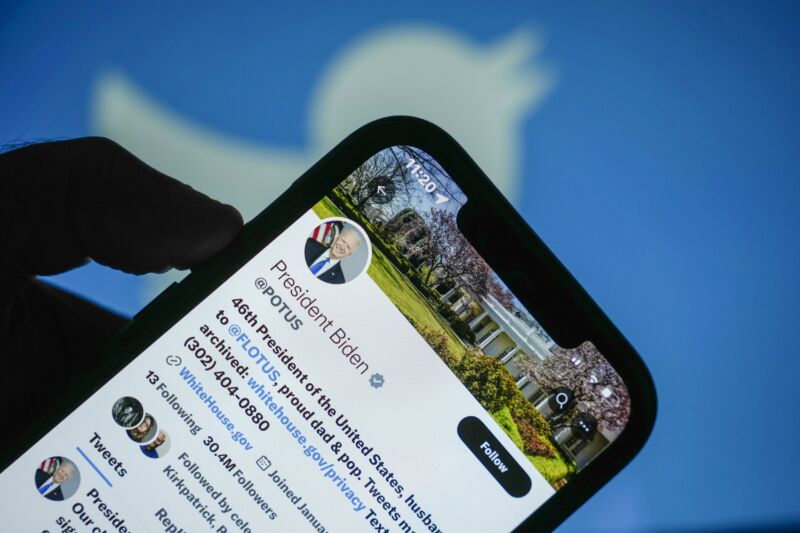Judge rules White House pressured social networks to “suppress free speech”

A federal judge yesterday ordered the Biden administration to halt a wide range of communications with social media companies, siding with Missouri and Louisiana in a lawsuit that alleges Biden and his administration violated the First Amendment by colluding with social networks “to suppress disfavored speakers, viewpoints, and content.”
The Biden administration argued that it communicated with tech companies to counter misinformation related to elections, COVID-19, and vaccines, and that it didn’t exert illegal pressure on the companies. The communications to social media companies were not significant enough “to convert private conduct into government conduct,” Department of Justice lawyers argued in the case.
But Judge Terry Doughty, a Trump nominee at US District Court for the Western District of Louisiana, granted the plaintiffs’ request for a preliminary injunction imposing limits on the Department of Health and Human Services, the National Institute of Allergy and Infectious Diseases, the Centers for Disease Control and Prevention, the Federal Bureau of Investigation, the Department of Justice, the US Census Bureau, the State Department, the Homeland Security Department, the Cybersecurity and Infrastructure Security Agency, and many specific officials at those agencies. The injunction also affects White House officials.
The agencies and officials are prohibited from communicating “with social-media companies for the purpose of urging, encouraging, pressuring, or inducing in any manner the removal, deletion, suppression, or reduction of content containing protected free speech posted on social-media platforms,” Doughty ruled. The injunction prohibits “specifically flagging content or posts on social-media platforms and/or forwarding such to social-media companies urging, encouraging, pressuring, or inducing in any manner for removal, deletion, suppression, or reduction of content containing protected free speech.”
Government agencies and officials are further barred from urging, encouraging, or pressuring social media companies “to change their guidelines for removing, deleting, suppressing, or reducing content containing protected free speech.” The ruling also said the government may not coordinate with third-party groups, including the Election Integrity Partnership, the Virality Project, and the Stanford Internet Observatory, to pressure social media companies.
Exceptions include voting misinformation
Doughty provided several exceptions that allow the government to communicate with social media companies about criminal activity and other speech that the First Amendment doesn’t protect. The Biden administration may continue to inform social networks about posts involving criminal activity or criminal conspiracies, national security threats, extortion, criminal efforts to suppress voting, illegal campaign contributions, cyberattacks against election infrastructure, foreign attempts to influence elections, threats to public safety and security, and posts intending to mislead voters about voting requirements and procedures.
The US can also exercise “permissible public government speech promoting government policies or views on matters of public concern,” communicate with social networks “in an effort to detect, prevent, or mitigate malicious cyber activity,” and “communicat[e] with social-media companies about deleting, removing, suppressing, or reducing posts on social-media platforms that are not protected free speech by the Free Speech Clause in the First Amendment to the United States Constitution.”
In addition to the Missouri and Louisiana attorneys general, the plaintiffs include professors Jayanta Bhattacharya and Martin Kulldorff, who co-authored the October 2020 “Great Barrington Declaration” that opposed COVID lockdowns and urged a focus on reaching herd immunity. They and other plaintiffs claim they were censored by social networks.
The ruling was criticized by Jameel Jaffer, an adjunct professor of law and journalism who is executive director of the Knight First Amendment Institute at Columbia University. “It can’t be that the government violates the First Amendment simply by engaging with the platforms about their content-moderation decisions and policies,” Jaffer told The New York Times, calling it “a pretty radical proposition that isn’t supported by the case law.”
While the government must be careful to avoid coercion in its efforts to combat false information, Jaffer said that “unfortunately, Judge Doughty’s order doesn’t reflect a serious effort to reconcile the competing principles.”
Stanford Law School Assistant Professor Evelyn Douek told The Washington Post that the “injunction is strikingly broad and clearly intended to chill any kind of contact between government actors and social media platforms.”
Judge finds “unrelenting pressure” on social networks
Doughty previously blocked federal vaccine and mask mandates in the Head Start program. In the social media case, Doughty made it clear that he expects plaintiffs to win in a 155-page memorandum ruling explaining his decision yesterday:
The Plaintiffs are likely to succeed on the merits on their claim that the United States Government, through the White House and numerous federal agencies, pressured and encouraged social-media companies to suppress free speech. Defendants used meetings and communications with social-media companies to pressure those companies to take down, reduce, and suppress the free speech of American citizens.
They flagged posts and provided information on the type of posts they wanted suppressed. They also followed up with directives to the social-media companies to provide them with information as to action the company had taken with regard to the flagged post. This seemingly unrelenting pressure by Defendants had the intended result of suppressing millions of protected free speech postings by American citizens.
The federal defendants “argue they only made requests to the social-media companies, and that the decision to modify or suppress content was each social-media company’s independent decision,” Doughty wrote. “However, when a state has so involved itself in the private party’s conduct, it cannot claim the conduct occurred as a result of private choice, even if the private party would have acted independently.”
He found that defendants “significantly encouraged” and in some cases coerced “the social-media companies to such extent that the decision should be deemed to be the decisions of the Government.”
https://arstechnica.com/?p=1951745